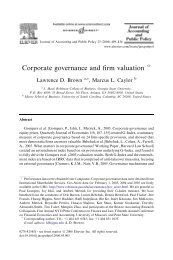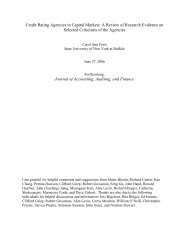Income Dynamics, Economic Rents and the Financialization of the ...
Income Dynamics, Economic Rents and the Financialization of the ...
Income Dynamics, Economic Rents and the Financialization of the ...
You also want an ePaper? Increase the reach of your titles
YUMPU automatically turns print PDFs into web optimized ePapers that Google loves.
ployees have reaped <strong>the</strong> rewards associated with <strong>the</strong> financialization <strong>of</strong> <strong>the</strong> US economy. In in-<br />
surance, banking, <strong>and</strong> real estate it is <strong>the</strong> owners <strong>of</strong> capital who have accumulated most <strong>of</strong> <strong>the</strong><br />
economic rents produced through financialization, although only in banking <strong>and</strong> for <strong>the</strong> new<br />
bank holding companies does this seem to be a long term, recurring transfer <strong>of</strong> national income.<br />
Of course, after 1999 <strong>the</strong> distinction between banks, insurance <strong>and</strong> investment firms was consi-<br />
derably weakened. The movement <strong>of</strong> investment activities into bank holding companies may<br />
weaken <strong>the</strong> influence <strong>of</strong> <strong>the</strong> employee compensation model in <strong>the</strong> old securities industry, as <strong>the</strong>se<br />
activities become absorbed in more bank-like organizations <strong>and</strong> <strong>the</strong> super earnings <strong>of</strong> traders are<br />
transferred into super pr<strong>of</strong>its <strong>of</strong> bank holding companies. In <strong>the</strong> absence <strong>of</strong> new regulation (or<br />
taxation) we can expect that <strong>the</strong>se super-sized diversified financial institutions will only increase<br />
<strong>the</strong>ir ability to absorb <strong>the</strong> income generated by <strong>the</strong> US economy. If that income is again depen-<br />
dent upon or is in a positive feedback loop with speculative financial investments it is only a<br />
matter <strong>of</strong> time before <strong>the</strong> next bubble <strong>and</strong> systematic crash.<br />
This paper is written at <strong>the</strong> beginning <strong>of</strong> 2010, just as Wall Street is making record pay-<br />
ments to its employees (Luchetti <strong>and</strong> Grocer 2009) <strong>and</strong> Ben Bernanke was reconfirmed as <strong>the</strong><br />
Chair <strong>of</strong> <strong>the</strong> Federal Reserve Bank. There is thus some reason to expect that <strong>the</strong>re will not be a<br />
fundamental shift in <strong>the</strong> regulatory approach to <strong>the</strong> finance sector <strong>and</strong> that finance as <strong>the</strong> new<br />
religion <strong>of</strong> economic policy may continue its sovereignty (Davis 2009) <strong>and</strong> continue to benefit<br />
from <strong>the</strong> income rents that accrue to its cultural as well as economic centrality. Somebody, <strong>of</strong><br />
course, always pays <strong>the</strong> rent. In this case it seems to have been <strong>the</strong> rest <strong>of</strong> <strong>the</strong> economy, both<br />
non-financial firms that paid increasing portions <strong>of</strong> <strong>the</strong>ir incomes to <strong>the</strong> finance sector <strong>and</strong><br />
households whose wages were restricted by <strong>the</strong> declining market power <strong>of</strong> <strong>the</strong>ir employers <strong>and</strong><br />
<strong>the</strong>ir increased payments <strong>of</strong> fees <strong>and</strong> interest to a financial sector ever more clever at extracting<br />
42







